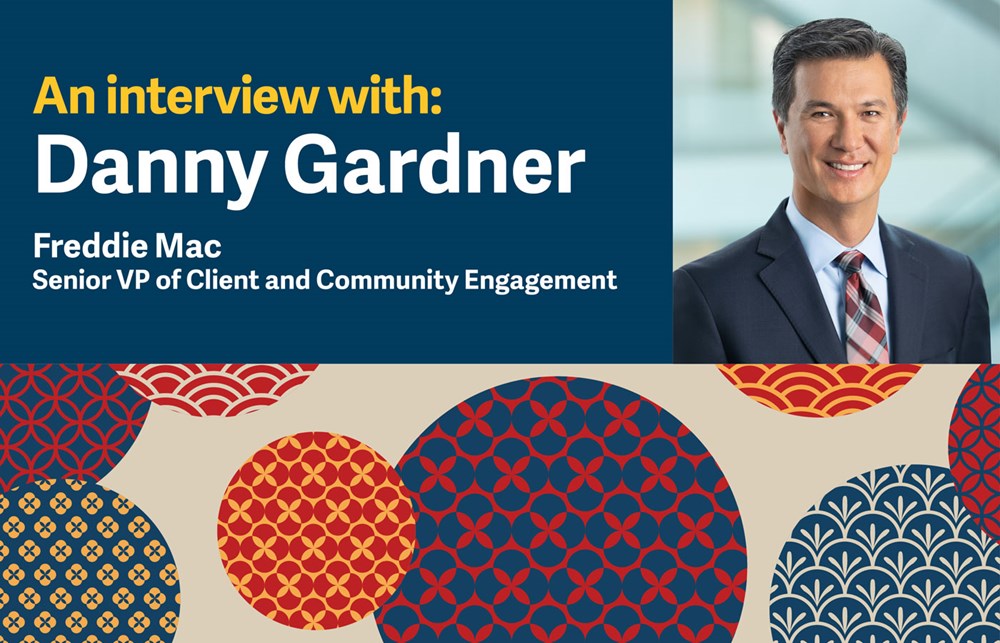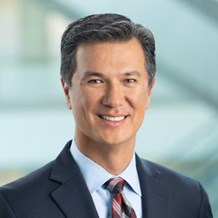In honor of Asian American Pacific Islander (AAPI) Heritage Month, we reached out to several prominent AAPI leaders in the housing and mortgage industry to celebrate their success, learn from their experience and gain insight into the challenges facing the mortgage industry. Today, we’re happy to share this interview with Danny Gardner (Senior Vice President of Client and Community Engagement for Freddie Mac’s Single-Family business).
Danny discusses how Freddie Mac supports equitable housing, why homeownership is the backbone of family stability, and minority homeownership rates.
Freddie Mac plays an important role in making homeownership a possibility and is very well-recognized within the mortgage industry. Can you tell me how Freddie Mac supports equitable housing?
At its core, Freddie Mac is an organization that seeks to make home possible for homebuyers, homeowners and renters nationwide. This is inherent to our mission of providing affordability, liquidity and stability for the mortgage market conceived 50 years ago. And the work across our Corporate, Multifamily and Single-Family business lines reflects this daily.
We are committed to ensuring equitable access to homeownership education, including assistance by trusted housing professionals and solutions to help qualified borrowers achieve homeownership. By using our breadth and scope across the housing market, we are able to identify challenges, recognize opportunities and drive solutions in the areas of affordability and access to credit. We work to convene the industry and take an insights-driven approach to pervasive equitable housing issues.
Your experience ranges from servicing to originating in the affordable lending space. Why is it so important to always have a diverse perspective, especially when it falls within the homeownership process?
I truly believe that homeownership is the backbone of neighborhood and family stability. Many people have immigrated to this country in search of the quintessential “American Dream” and a key component of their wealth creation has been homeownership. But that road to homeownership has often been rocky for marginalized groups—marred by exclusionary immigration policies and racially restrictive housing practices.
As an industry, we’ve had to face this painful past with stark honesty, and over the decades much work has been done to build trust between communities and housing professionals. Diversity and inclusion among housing industry stakeholders is a mandatory factor in that trust-building process. We need diverse perspectives as we work to understand the unique needs of diverse consumer segments and overcome hurdles to building more culturally and racially inclusive communities.
Moving into a more personal topic, can you share a bit about your cultural background and how that has played a role in your personal and professional life?
My introduction to diversity was given very early in life. I was born in Vietnam and my family moved to America when I was a baby to a small town in Texas. My mother’s Asian heritage and my father’s Texas upbringing blended into a family culture that looked very different than other kids’ families in our community.
Growing up, I was the only Asian student in my class. Knowing that I was different but wanting to belong gave me a perspective of open mindedness to other cultures, perspectives and traditions. I’ve always been intrigued by others’ differences but simultaneously sought out common threads to bond with others.
As I moved into the career of housing finance, I never lost sight of the fact that our country is very diverse culturally, geographically, economically. There is no one solution for everyone. I enjoy thinking about these challenges on a very nuanced level. Some of my most rewarding projects have come about as a result of asking the simple question, “how can I find custom solutions for very unique needs?”. When you think about urban America versus rural America, or single-family homes versus condominiums—there’s so much diversity in the need, the motivation and desire of different communities and families. I don’t think I would be as attuned to those distinctions or feel so deeply about the outcomes were it not for my own background.
Now more than ever, it’s very important that we’re all engaging inclusively and addressing racial inequity. Can you tell us how your work has been influenced or enhanced by diverse experiences?
I’ve had the pleasure of being in the affordable and inclusive lending space since 1995, so, it’s essentially been my life’s work. But at the same time, I can’t help but feel some level of disappointment to see that we haven’t gained more ground in that time.
While the U.S. homeownership rate has recently seen an uptick, minority homeownership rates continue to lag behind the national average, according to a February 2020 study by the National Association of Realtors®.
Still, I know there must be a solution out there, and that keeps me motivated. We have to continue to think about it differently—with unconventional solutions and earnest industry collaboration. As Albert Einstein said, “We can’t solve problems by using the same kind of thinking we used when we created them.”
It’s very unfortunate to see so many acts of anti-Asian racism happening throughout our country. Is there anything you would like to say to fellow Asian individuals facing these unfortunate times?
Sadly, there are still elements of our culture that are more focused on highlighting our differences than learning from and appreciating one another. My heart breaks when I hear of anti-Asian vitriol and violence. From a young age, many children of immigrants have taken on the role of protecting our elders and others in our community. We grew up interpreting for them, putting ourselves as shields between rude comments or ignorant perceptions. The instinctual feeling that I had as the child of an immigrant to protect and shield my loved ones kicks in when I read painful headlines and hear about communities in fear.
Through that collective sorrow we must continue to offer each other love and strength. Now more than ever, it’s important that we celebrate the rich diversity of our country and speak out against xenophobia and discrimination.
Looking back at your professional trajectory, what advice would you give to your younger self and why?
Like many other Asian American children, I grew up with my mother’s strong work ethic instilled in me. In so many ways that has served me well. My career has been fulfilling and I’ve worked to ensure an easier path for my children. But if I could give my younger self a word of advice it would be to find time for balance.
See your favorite rock concerts, take that extended vacation and don’t pass up on the moments that will give you joy. You can’t get those back."
Mortgage Connects
Danny Gardner Q&A: Overcoming hurdles to build more culturally inclusive communities


Danny Gardner, Senior Vice President of Client and Community Engagement
Danny Gardner is Senior Vice President of Client and Community Engagement for Freddie Mac’s Single-Family business. In addition to assuming Sales leadership, Mr. Gardner is responsible for fulfilling Freddie Mac’s community mission to provide sustainable homeownership education and financing to families who are traditionally underserved by the market. He is also responsible for overseeing Freddie Mac’s delivery and performance against Single-Family Affordable Lending’s goals, Duty to Serve regulation and Access to Credit activities in the FHFA Scorecard.